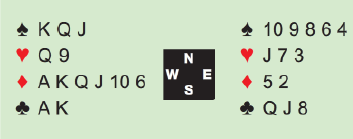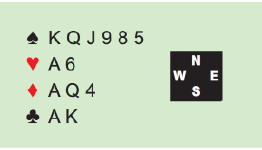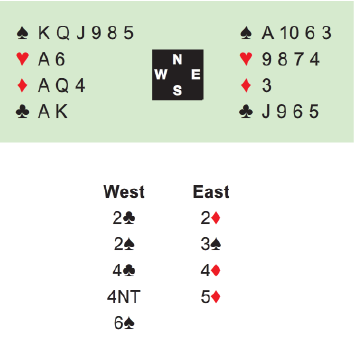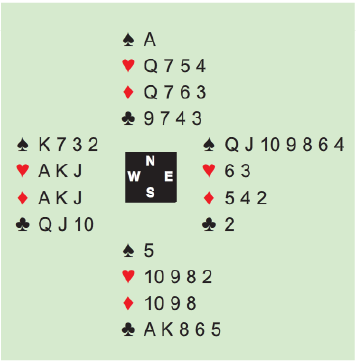Source: Mr Bridge Freddie North is one of Britain’s most popular bridge writers.
The temptation to overbid big hands is human; tempering the urge to splurge, as it were, comes only with experience. Perhaps Oscar Wilde’s quote ‘I can resist anything except temptation’ sums up the obstacles a bridge player has to overcome when confronted with a galaxy of goodies.
Suppose West picks up the kind of hand we like to have at rubber bridge:

You have 25 points but must remember that you have already shown a game-going hand. The very worst thing West can do is to continue with 4NT, asking for aces. This results in a minus score when the two hands are like this:

East will respond 5 to show no aces and, whatever suit you play in, you will lose three tricks. So what should West bid over 3
to show no aces and, whatever suit you play in, you will lose three tricks. So what should West bid over 3 ? 4
? 4 is fine. Remember, you have already promised a big hand. What are the secrets that stop most top players from bidding too much on powerful hands? It’s simple really. Having bid their values, they leave their partners to do the pushing. With nothing to add, partner goes quietly.
is fine. Remember, you have already promised a big hand. What are the secrets that stop most top players from bidding too much on powerful hands? It’s simple really. Having bid their values, they leave their partners to do the pushing. With nothing to add, partner goes quietly.
Of course, if partner has any special features, he can come to life later. Here is an example. You are West the dealer.

Twenty-three points and a six-card suit —that’s a great start and warrants an opening bid of 2 . East responds 2
. East responds 2 (negative) and, when you rebid 2
(negative) and, when you rebid 2 , raises to 3
, raises to 3 . What do you bid now? Although the spade fit is good news, it would be a mistake to jump to 4NT at this stage because even if partner shows one ace you still won’t know whether a slam is good or bad. You should make a cue bid of 4
. What do you bid now? Although the spade fit is good news, it would be a mistake to jump to 4NT at this stage because even if partner shows one ace you still won’t know whether a slam is good or bad. You should make a cue bid of 4 . This keeps the bidding low and gives East the chance to show a feature. In fact, East bids 4
. This keeps the bidding low and gives East the chance to show a feature. In fact, East bids 4 over 4
over 4 , after which West can bid 4NT with some confidence. These are the two hands:
, after which West can bid 4NT with some confidence. These are the two hands:

You’ll notice that East first agreed the trump suit and then leapt at the chance to show his singleton diamond (the deal comes from rubber bridge — at duplicate East might bid a 4 splinter over 2
splinter over 2 to show both features at once).
to show both features at once).
My last offering features West with another fine hand.

West opened with an impeccable 2NT (20-22 points). East responded 4 . Even though West knew the 4
. Even though West knew the 4 bid was a sign off, he couldn’t resist the temptation of `one small effort’ and went on to 5
bid was a sign off, he couldn’t resist the temptation of `one small effort’ and went on to 5 . East passed in haste. When South cashed a top club and switched to a heart, East was none too happy. With two black aces to lose, his thoughts centred on trying to combine his chances in the red suits. He could cash two top diamonds; if the queen did not fall, he could ruff a club and take the heart finesse. On further reflection, East saw a better chance. Winning the heart in dummy, he ruffed a club, went back to dummy with a diamond and ruffed another club. Now he exited with a spade and was pleased to find North with the singleton ace. North had to lead into a red tenace or give a ruff and discard. Well, East had saved the day. West no doubt heaved a sigh of relief. However, if South had switched to a trump at trick two, West’s five-level foray would have met a different fate. The moral is clear. Don’t overbid big hands. Show your hand once and allow partner to do any pushing necessary.
. East passed in haste. When South cashed a top club and switched to a heart, East was none too happy. With two black aces to lose, his thoughts centred on trying to combine his chances in the red suits. He could cash two top diamonds; if the queen did not fall, he could ruff a club and take the heart finesse. On further reflection, East saw a better chance. Winning the heart in dummy, he ruffed a club, went back to dummy with a diamond and ruffed another club. Now he exited with a spade and was pleased to find North with the singleton ace. North had to lead into a red tenace or give a ruff and discard. Well, East had saved the day. West no doubt heaved a sigh of relief. However, if South had switched to a trump at trick two, West’s five-level foray would have met a different fate. The moral is clear. Don’t overbid big hands. Show your hand once and allow partner to do any pushing necessary.
